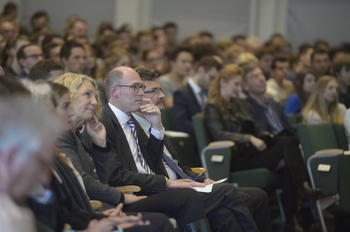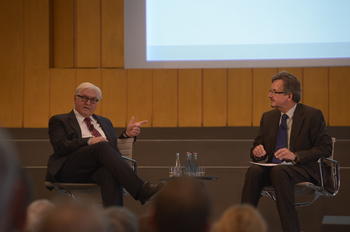“The World Is Looking for a New Order”
German Foreign Minister Frank-Walter Steinmeier was a guest at Freie Universität to mark the 70th anniversary of the formation of the United Nations
Dec 15, 2015
“Don’t erect mental borders” – In his speech, German foreign minister Frank-Walter Steinmeier addressed the subject of refugees and called for openness toward change.
Image Credit: Bernd Wannenmacher
The large auditorium was filled to the brim. The speech was also shown in a neighboring lecture hall.
Image Credit: Bernd Wannenmacher
After delivering his remarks, the Foreign Minister talked with students; at right, moderator and political science professor Thomas Risse.
Image Credit: Bernd Wannenmacher
University president Peter-André Alt and political science professor Thomas Risse (to his left) were seated in the front row during the German Foreign Minister’s speech.
Image Credit: Bernd Wannenmacher
“To save succeeding generations from the scourge of war” – that has been the main purpose of the United Nations ever since the organization was founded back in 1945. Now, in 2015, that goal seems to have moved out of reach in light of current global events: Is the world out of joint?
Frank-Walter Steinmeier offered answers in his speech on the international order 70 years after the founding of the United Nations. The German Foreign Minister appealed to nations to shoulder responsibility beyond their own borders.
Who is this man who represents Germany’s interests in other countries, who rushes from one negotiating table to the next, most recently in Iran, Syria, Jordan, and Saudi Arabia – and what does he say about the urgent questions of our times, about crises, wars, terrorism, and the misery of refugees?
About 2,000 people gathered at the Henry Ford Building at Freie Universität at midday on a Wednesday to hear the German Foreign Minister, Frank-Walter Steinmeier. As the large auditorium only seats 1,200, several hundred audience members went to a lecture hall instead, where the speech was shown on a large screen.
The reason for Steinmeier’s visit was the 70th anniversary of the formation of the United Nations and an invitation from Freie Universität, whose university library has been a United Nations Depository Library since 1956. During his speech, which lasted about an hour and was followed by a roundtable discussion moderated by Thomas Risse, a professor of political science and Director of the Center for Transnational Studies, Foreign and Security Policy at Freie Universität, the audience saw Steinmeier as a man who recounted anecdotes from his everyday life as a diplomat, but also found clear words on subjects such as Russia’s role in the Syrian conflict and how to deal with the millions of refugees who are looking for a new home in places including Germany.
He also showed himself to be a person who is aware of opposition and can handle criticism. At the start of his speech, faced with isolated heckling and brief disruptions by students, Steinmeier stayed calm. As he said, “Anything else would have been disappointing at a university.”
“No Fear of Change”
“We live in an era when the world is becoming smaller, but crises are tending to become larger,” Steinmeier said. He explained that the world was growing closer together – technologically, economically, and socially. The latter point, Steinmeier said, was especially clear from the plight of the hundreds of thousands of refugees who are on the move in search of safety and a new home, fleeing to Germany and elsewhere. Walling oneself off is not the right response to trends like these, Steinmeier said. “If it is true that national borders are disappearing, this is exactly the wrong moment to put up mental borders again.”
Steinmeier said the concept of a “dominant German culture” was the wrong one; instead, the issue is how we want to live together across borders. Striking a balance between change and order, following the rules while still leaving room for development – the Foreign Minister said it was possible, with good results, in a democratic system.
“That’s because democracies can challenge themselves. That takes some effort, but it makes peaceful change possible. That’s why in a democracy, we do not have to fear change.”
Steinmeier cited Germany as an example, saying that the country proved this long ago. He pointed out that since the end of World War II, the country has become a new home time and again, for many millions of people.
Steinmeier praised the efforts that Freie Universität is making to help refugees. The Welcome to Freie Unviersität Berlin program and the hard work and dedication being shown by many employees and students deserved a round of applause, he said. Work to study relations among nations, but also societal coexistence, such as in Collaborative Research Center 700, which deals with governance in areas of limited statehood, has a firm place at Freie Universität, the president of Freie Universität, Professor Peter-André Alt, said in his welcome address. As he pointed out, “People from more than 130 nations who teach and study together are represented at our campus.”
A People of Good Neighbors
Steinmeier also said that German Chancellor Willy Brandt’s famous 1969 remark that Germans wanted to be “a people of good neighbors” was still applicable today. “We Germans want to be a people of good neighbors – for those near and far.” The “good neighbor” image was also an apt one for describing the job of diplomacy: It only works when all the neighbors share responsibilities, even beyond their own fences. “I always tell my international colleagues, neighbors don’t have to like each other – they don’t have to sit down together at the bar every evening – but they do have to be able to come together to solve problems that concern them.”
Diplomacy on the Water
But what if hostile parties don’t want to talk to each other at all? Steinmeier and his team have a solution for that, too: All aboard a riverboat on the Spree – “Then no one can get away!” he said. The audience was visibly amused at this anecdote from everyday diplomacy, which did in fact take place last summer, when four conflicting parties from Libya came to Berlin for talks.
The parties’ positions were so entrenched that they did not even want to travel on the same plane. “Up until then, these people had only shot at each other, but had never talked to each other.”
They did end up flying to Berlin together after all – which marked an important first step, namely by signaling their fundamental willingness to talk, Steinmeier explained. After arriving at Tegel Airport, the enemies were invited to a meal – on the aforementioned riverboat on the Spree. It was a success, as Steinmeier recounted, because after sharing a table and the view of the river with each other, the next day’s political talks were easier, too.
On Strategic Patience and the Art of Feasibility
“Peace and war never just fall out of the sky,” Steinmeier said, summarizing the crux of diplomatic efforts. In foreign policy, what pays is perseverance, Steinmeier said, pointing to the nuclear agreement with Iran, which was just concluded this year, following many years of tough negotiations. Strategic patience and the art of feasibility lie at the heart of diplomacy.
The same principles also hold true in the Syrian conflict. The German Foreign Minister criticized Moscow’s military intervention in Syria in his speech. He said, “We need Russia’s involvement at the negotiating table. The country’s future does not lie on the battlefield.” True security, he said, was something that could only be worked out together.
So why not organize a boat ride on the Spree with Russian President Vladimir Putin and Syrian Head of State Bashar Al-Assad, one student asked during the subsequent roundtable discussion. Indeed, Steinmeier said, but he pointed out that the neighboring countries also belonged at the negotiating table. A ceasefire without Assad would be impossible – but so would peace with Assad, a Syrian opposition member told him recently.
And what about Steinmeier himself? He sees Assad as at least being part of a process of transformation that the country urgently needs.
“In 1945, the world order lay in ruins.”
It is no accident, Steinmeier said, that crises and wars are occurring so close together right now, citing what he called “erosion of existing orders” as the reason. To Steinmeier, the opposite of order is not merely disorder; in the international community, the absence of order means violence.
When the Charter of the United Nations took effect, on October 24, 1945, the “world order was not only out of joint – it lay in ruins,” Steinmeier said. World War II was followed by the Cold War, a new order in which the two global superpowers, the United States and the Soviet Union, split the world into two camps.
“Viewed in political terms, this bifurcation brought a cynical certainty with it. As a nation, you had to align yourself with one side or the other. At the same time, you also knew in relatively good detail from others how this determination affected political decisions,” Steinmeier said.
The long-awaited end of the Cold War 25 years ago, the end of the “bipolar era,” according to Steinmeier, brought the realization that the struggle for influence, prestige, and dominance was a violent one. “The world is looking for a new order. It’s up to us to reorganize how we live together time and again on the foundation built by the United Nations. The moment when the organization was founded, 70 years ago, shows that it is possible. We can create order.”




